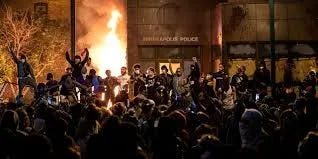Let’s consider for a moment the dog that didn’t bark.
One week ago, there were all kinds of things we were calculating and worrying about (and continue to calculate and worry about). One of them was the possibility of civil violence. We saw images of stores being boarded up, of extra fencing around the Capitol, of pronouncements from law enforcement officials that they were ready for whatever might come.
Nothing came.
There are all kinds of explanations for this. Perhaps the most obvious is that Trump won: if he had lost, there was good reason to think some of his followers would refuse to accept the result. It was also conceivable to think that some on the far left might themselves revolt, something they had done in the aftermath of the George Floyd murder, though that seemed less likely. What did seem likely, though, is that a very close contest would raise temperatures and lower the threshold for civil unrest in ways that seemed probable but whose particulars were hard to foresee. But again, that didn’t happen, because the result wasn’t close, and the outcome was clear by dawn.
I’d like to think that the relative calm in the aftermath of the election—more elation than vengeance; more deflation than fury—reflects the underlying foundations of American democracy, conditioned as it is to contain victory and loss within a procedural framework.
But it’s more likely a matter of luck.
I don’t assume that luck will hold indefinitely. Very likely something I didn’t pay much attention to will end up being a much bigger deal than I initially imagined—like a policy whose implementation has far more dramatic results than anticipated, or a theory or opposition springs into life over something that initially seemed trivial. Perhaps it will be a sudden event for which the nation is woefully unprepared.
Maybe, in the face of such a severe challenge, we’ll return to the better angels of our nature, or find resources we didn’t know we had. Or maybe not.
For the moment, let’s savor the quiet, however tinged by melancholy.



